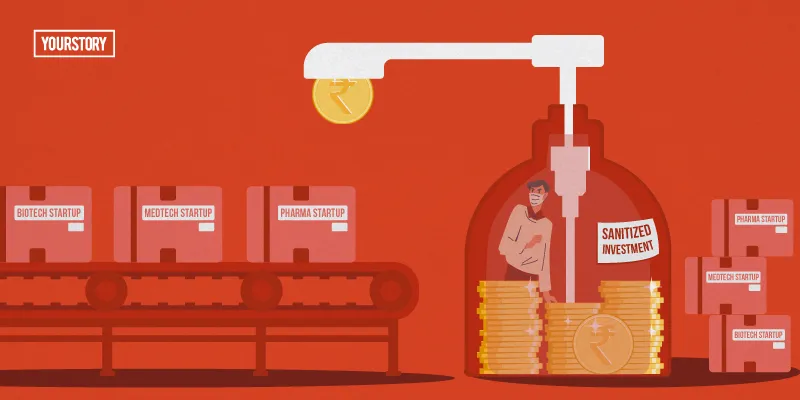The week that was – From fighting coronavirus with technology to how India consumed during the pandemic
This week, we spoke to entrepreneurs and investors and took stock of how funding will be impacted in the coronavirus era.
Since the novel coronavirus invaded our lives, consumer behaviour has drastically changed in India and across the world.
While the lockdown resulted in panic buying and people hoarding essential items such as rice, wheat, packaged food, home care products, etc., reports suggest that people did not stock up much on confectionery and beverages, but only rushed to stock up on essentials.
YourStory gathered data from Bizom – a SaaS startup for retailers – for the first 15 weeks of the year. The startup has been working with more than 350 top brands, including Coca-Cola, Cargill, Hershey’s, Molson Coors, Shell, and United Breweries.
“In the weeks following the ‘Janata curfew’, sales of all categories of consumer goods were impacted. Certain categories such as beverages and confectionery were wiped out, but few categories such as packaged foods and commodities are weathering the storm better. Local brands and Indian kirana stores have shown resilience, with the recovery of almost 65 percent by the third week of the lockdown,” says Lalit Bhise, Co-founder, Mobisy Technologies, which also owns Bizom.
Earlier this week, we spoke to Kailash Nadh, the Chief Technology Officer of Zerodha, India’s biggest online broking firm. A techie without an engineering background, Kailash has always believed in the practical use of coding and learning from building things. Even today, while hiring for his team, he does not look at what institute the candidate has graduated from, but looks at what they have built, and what projects they have been part of.
“I have only hired hackers - people who have tinkered around. If you want to be a good developer, embrace the hacker culture, build, break, and tinker things for fun,” says Kailash.
Bharat.live, a video conferencing platform developed by Dehradun-based startup ileads Auxiliary Services Pvt Ltd, is making all the right noises. “Bharat.live aims to offer video conferencing services with data security at a cost that is suitable for every Indian,” says Ankur Sinha, Co-founder, ileads Auxiliary Services.
Founded in 2018 by Ankur and Anubha Sinha, the Bharat.live platform is focussed on providing security, besides working on low internet bandwidth, and is easy to use. According to the startup, the key element the team kept in mind while developing the platform is simplicity and privacy.
Bengaluru-based AIkenist has come up with an artificial intelligence (AI) tool, which distinguishes COVID-19 related pneumonia, depending on the patient’s lung damage.
The startup was founded in 2019 by Ashwin Amarapur, which provides AI-based solutions for faster scanning and better detection, with quick turnaround solutions for healthcare problems.

Ashwin Amarapur, Founder and CEO, AIkenist
Speaking to YourStory, Ashwin Amarapur, Founder and CEO, AIkenist, explains, the startup has developed a cloud-hosted AI solution called ‘AIkenist QuickDiag COVID-19’, which is compatible with all kinds of digital X-ray and CT scanning machines. The chest X-ray and CT-scan images are pushed to the cloud service where lung anomaly is diagnosed to screen COVID-19 patients.
From innovation to startup funding — on March 6, 2020, Silicon Valley’s most prominent VC firm Sequoia Capital sent shivers down the entrepreneurial world in a note to its portfolio companies.

Illustration: Aditya Ranade
Sequoia termed the coronavirus pandemic “the black swan of 2020”, one that would have far-reaching implications — as dire as those witnessed during the global economic crisis of 2008-09. Two months on, the full-fledged ramifications of the pandemic on VC investing and startup funding are starting to unravel. “These are challenging times. We are facing a crisis of both life and livelihood,” says Atul Nishar, President of TiE Mumbai.
According to KPMG’s Venture Pulse study, this is a ‘testing’ period because, after a record-shattering Q4’ 2019, VC investments in Asia are headed for a 12-quarter low. Funding fell to just $2.2 billion in Q1’ 2020, from a record high of $6 billion in Q4’ 2019, mostly due to economic uncertainty around COVID-19. In the quarter, the average deal value stood at $140 million.
Thanks to the coronavirus pandemic, the hospitality industry is going through its own set of challenges.
Amid the COVID-19 pandemic and the resultant lockdown, the restaurant sector is one of the worst-hit. Over two million (20 lakh) people directly employed in the sector may be rendered jobless, according to the National Restaurant Association of India (NRAI) that represents over 500,000 restaurants across the country.
The restaurant industry provides direct employment to 7.3 million Indians, and it is estimated that an equivalent number is engaged in ancillary activities. “A modest 30 percent job loss could mean over two million people directly employed in the sector being rendered jobless. This may lead to larger societal problems,” says NRAI President Anurag Katriar.
Edited by Suman Singh




![[Techie Tuesday] Meet Kailash Nadh, the self-taught coder who built tech for India’s largest online brokerage - Zerodha](https://images.yourstory.com/cs/2/a9efa9c02dd911e9adc52d913c55075e/TT-1588575581186.png?fm=png&auto=format&h=100&w=100&crop=entropy&fit=crop)





